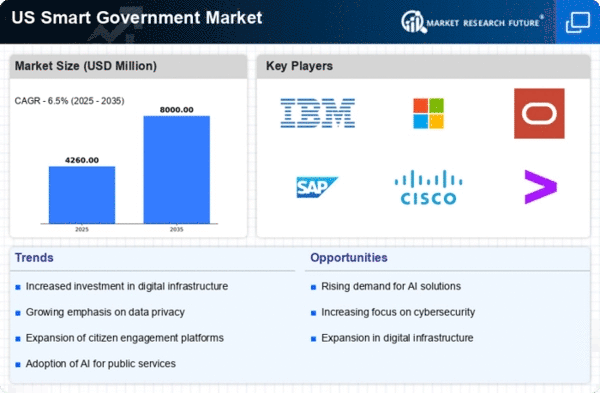Rise of Mobile Solutions
The rise of mobile solutions is transforming the smart government market, as citizens increasingly rely on mobile devices for accessing government services. This trend is prompting governments to develop mobile applications that facilitate service delivery, information dissemination, and citizen engagement. With over 80% of the population owning smartphones, the demand for mobile-friendly services is at an all-time high. Governments are responding by investing in mobile technology, which is projected to account for 40% of all government service interactions by 2027. This shift not only enhances accessibility but also fosters a more connected and engaged citizenry, driving growth in the smart government market.
Increased Demand for Transparency
There is a growing demand for transparency in government operations, which is significantly influencing the smart government market. Citizens are increasingly expecting open access to information regarding government activities, budgets, and decision-making processes. This trend is prompting governments to implement digital platforms that facilitate real-time data sharing and reporting. According to recent studies, 75% of citizens believe that transparency enhances trust in government. As a result, investments in technologies that promote transparency, such as blockchain and open data initiatives, are on the rise. This shift not only fosters accountability but also encourages citizen participation, thereby driving the smart government market forward.
Integration of Advanced Analytics
The integration of advanced analytics into government operations is reshaping the smart government market. By leveraging big data and predictive analytics, governments can make informed decisions that enhance service delivery and resource allocation. This trend is evident as agencies increasingly utilize data to identify trends, optimize operations, and improve public safety. Reports indicate that the use of analytics in government is expected to grow by 30% over the next five years. This capability allows for more proactive governance, ultimately leading to improved citizen satisfaction and engagement, thereby propelling the smart government market.
Focus on Sustainability Initiatives
Sustainability initiatives are becoming a central focus for governments, impacting the smart government market significantly. As environmental concerns rise, there is an increasing push for smart solutions that promote energy efficiency and reduce carbon footprints. Governments are investing in smart grids, waste management systems, and sustainable urban planning to address these challenges. For example, the market for smart city technologies is expected to reach $2 trillion by 2030, driven by the need for sustainable urban development. This emphasis on sustainability not only aligns with public expectations but also opens new avenues for innovation within the smart government market.
Technological Advancements in Infrastructure
The smart government market is experiencing a surge in technological advancements, particularly in infrastructure development. Innovations such as cloud computing, IoT, and AI are being integrated into government operations, enhancing efficiency and service delivery. For instance, the adoption of cloud services is projected to grow by 20% annually, enabling agencies to streamline processes and reduce operational costs. This shift not only improves internal workflows but also enhances citizen interactions, making services more accessible. As governments invest in modernizing their infrastructure, the smart government market is likely to expand, with an estimated market value reaching $100 billion by 2026. This growth reflects a broader trend towards digital transformation in public services.
















